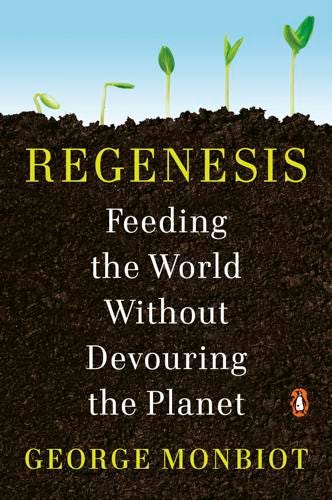Regenesis: Feeding the World Without Devouring the Planet
A book review
Regenesis: Feeding the World Without Devouring the Planet
George Monbiot
Peguin Books 2022
242 pages
From the beginning of his career, starting with his nature programing on the BBC, George Monbiot has demonstrated that he cares deeply about the natural world. He also cares about people. He thinks that they should not go hungry and their voices should be heard. For years, I’ve read the columns Monbiot has written for The Guardian. He has always impressed me with three qualities in equal measure: his fair-mindedness, his willingness to research deeply and reach conclusions based on facts, and his ability to call bullshit.
All these qualities imbue Monbiot’s latest book, Regenesis: Feeding the World Without Devouring the Planet, in which he claims that agriculture has become humanity’s greatest ecological sin, and if we are to have a habitable world, one that is worthwhile to live in and makes room for the other creatures with whom we share this planet, then a great deal of how we raise our food has to change. Much of what we expect to be served on our breakfast plates and dinner plates needs to change as well.
Those who have stood at the edge of a tar sands operation and beheld its sprawling destruction or glimpsed the devastation of a mountaintop removal mine, or smelled the rotting carcasses strewn across the tarry goo of an oil spill may disagree with Monbiot’s claim that agriculture is humanity’s number one environmental harm, but he convincingly makes the case that much wreckage has been made while we have been growing food to feed ourselves. He writes:
Farming is the world’s greatest cause of habitat destruction, the greatest cause of the global loss of wildlife, and the greatest cause of the global extinction crisis. It’s responsible for around 80 percent of the deforestation that’s happened this century. Food production (including commercial fishing) is the main reason why the global population of wild vertebrate animals has fallen by 68 percent since 1970. Of 28,000 species known to be at imminent risk of extinction, 24,000 are threatened by farming. Only 29 percent of the weight of birds on Earth consists of wild species: all the rest are poultry. Chickens alone weigh more than all other birds put together, including farmed ducks and turkeys. Just 4 percent of the world’s mammals, by weight, are wild; humans account for 36 percent, and livestock for the remaining 60 percent. This is not caused by intensive farming or extensive farming, but by a disastrous combination of the two.1
I have to admit that most of these facts are topsy-turvy to much of what I thought of farming, and I’m a fairly well informed person who writes about agriculture from time to time.
Examining soil and farming from the very small to the very big
Monbiot opens his book pleasantly, recounting time in his community orchard. He also spends the better part of a morning spading up some soil. With the joy of a precocious seven-year-old, he waxes about the springtails, ants, worms, and other creatures that creep and crawl in his spadeful. He describes further the intricate web of bacteria, fungi, and other organisms that make soil an intricate ecology. This outing serves as a starting point both specifically—much of later chapters concern how farmers treat their soil—and allegorically: each system, whether it be the workings of a small farm or our global food distribution system, is complex and not prone to taking well to abuse.
This ecology in Monbiot’s spade, the living earth he pulls from the ground, has been ignored in our standard model of farming. Gardeners, agronomists, and farmers have viewed the earth as something of a vacua terra. Soil is but a medium in which to grow crops. Keep the bugs away, throw some fertilizer in, and everything should be fine. This model of farming has given us erosion and polluted streams. Tilling soil also releases carbon. As Monbiot writes, some 133 billion tons are thought to have been lost from the world’s soils since the dawn of agriculture.
In subsequent chapters we meet Paul, Tim, a man called Tolly, and others, each farming a bit of land in a manner contrary to the standard till-plant-pesticide-herbicide-harvest model. By being more integrated with their environments, the farmers tell of their success against pests, even while they eschew pesticides. Their farms can be more resistant to storm damage and drought. All in all, their farms are more resilient.
In other chapters, Monbiot bakes bread with flour made from the grain of plants cultivated to be perennial. (All grain comes from annual crops.). The perennials need less tilling than annuals. He also enjoys a pancake made from laboratory grown microbes, a high-tech solution to our hunger for meat. The pages devoted to cooking and eating the foods from the farms and labs are delightful. If George Monbiot wants to become a food writer, I’m certain he’ll have an engaged readership.
Monbiot is no romantic, nor is he a gearhead in love with the next techno-fix. Answers to our agricultural crisis can be found on a low-tech, no-till, small farm or from laboratory grown microbes. The Guardian columnist credits the farmers and others he worked with on this project as being truthful with themselves when it comes to the effectiveness of their methods. They are willing to admit that their approach has downsides or environmental costs. One farmer who foregoes plowing, which leaves the soil and the microorganisms intact, is very reliant on herbicides; another makes almost zero profits for all his efforts.
Regenesis is comprehensively researched. It is also quite readable. A good balance was found between statistics, facts, and figures and the descriptions of the farms and the people involved with them. Monbiot is dealing with a tough subject, yet I never felt that he was being a scold. The book can be read quickly. If you don’t check through the roughly 100 pages of notes, the text of the book is only 234 pages. Regenesis is highly recommended by The Green Dispatch.
For more environmental science & news follow me on Twitter @EcoScripsit.
You might want to argue with George Monbiot on these points. I wouldn’t. EVERYTHING, every fact is well sourced and footnoted.




Sounds really interesting, something worth adding to my list.